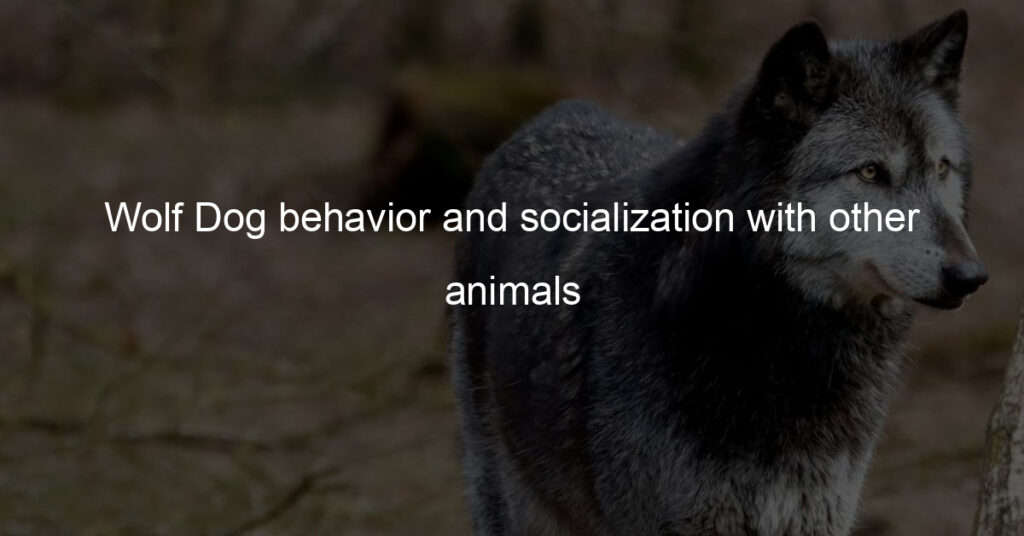If you own a wolf dog, chances are you know how important it is to properly understand and care for them. Not only do they come with their own unique set of behaviors, but also the added responsibility of socializing them with other animals can be quite daunting.
That’s why we’ve put together this blog post on wolf dogs’ behavior and socialization with other animals – so that all owners can feel confident in caring effectively for their pets! Read on to learn more about the best practices around your four-footed friend’s needs, as well as tips and tricks on helping him or her become comfortable within a variety of different scenarios.
Are wolf dogs good with other animals?
Wolf dogs, otherwise known as ‘Wolf hybrids’, are a mix of domestic dogs and grey wolves. When it comes to companionship, they typically do well with other animals such as cats, rabbits, and horses – especially if they have been raised by them since puppyhood.
That being said, being wild animals at heart, wolf dogs need to be appropriately socialized with other species to avoid any potential negative behaviors like chasing or intimidation due to curiosity or predatory instinct. If done right and with enough effort, wolf dog owners will often find they make loving additions to any family.
Are wolf dogs aggressive to other dogs?
While wolf dogs may seem intimidating to some, their demeanor towards other canines is highly dependent on their upbringing. Socialization, as well as training, are key components in determining how a wolf-dog acts around other pooches. When properly trained and socialized, these hybrid dogs can make wonderful and exciting four-legged companions, full of love and respect for the canine peers surrounding them.
Moreover, depending on their mix, some wolf dogs may even have calmer tendencies than domesticated breeds. However, it’s important to keep in mind that each animal has its temperament and behavior that could potentially be detrimental when placed in unfamiliar situations.
Can wolfdogs be service dogs?
It’s natural to assume that wolfdogs wouldn’t make suitable service dogs, given their wild tendencies. But the truth is, many wolfdog owners are training their breeds to be just as capable and reliable as any other trained service dog.
Of course, there are certain aspects of introducing a higher percentage of wolves into a domesticated breed that need consideration—such as potential temperamental issues—but these can usually be managed if done through reputable sources.
Additionally, when done safely they can offer certain benefits over more traditional service animals like heightened protection or an increased sense of loyalty. All in all, it’s clear that with patience and proper handling, many wolfdogs can certainly be worthy contenders for becoming full-fledged service dogs.
Do wolf-dog hybrids make good pets?
Wolf-dog hybrids can be an intriguing and often exotic choice of pet. But before embarking on owning a wolf hybrid, it is important to consider if this type of animal is the best for you. Many people are captivated by their unique appearance or wolf-like behaviors, but these animals require more than just love and commitment from their owners.
Having specialized knowledge of wolves is necessary when caring for a hybrid, as they need an environment that meets their diverse needs. Although this can prove to be challenging and time-consuming, some have the resources and experience to make incredible companions out of wolf-dog hybrids.
What is the behavior of a wolfdog?
The behavior of a wolfdog is highly dependent on its upbringing and environment. Wolf dogs tend to display both canine and wild traits, which can lead them to exhibit unpredictability in certain situations.
Regular socialization, training, and exercise are essential for keeping these hybrids well-behaved; this helps ensure that they understand boundaries as well as proper interaction with humans and other animals. Wolfdogs will typically respond to commands and can form close bonds with their owners, but it is important to be aware that due to their wild ancestry, they may never quite become 100% domesticated.
Conclusion: Wolf Dog behavior and socialization with other animals
Despite their bad reputation, wolf dogs can still make wonderful pets if they are properly socialized and cared for. They need exercise, mental stimulation, consistent training, and supervision so that their natural inclinations can be managed during interactions with other animals.
Their behavior often varies depending on their upbringing and environment. With the right training and socialization program, wolf dogs can live happy, balanced life. As a result, it is important to consider the labor-intensive amount of work and ongoing commitment required when looking for a companion for an animal. Overall, investing time in wolf-dog behavior and socialization with other animals will create an enriching experience for both you and your pet.








